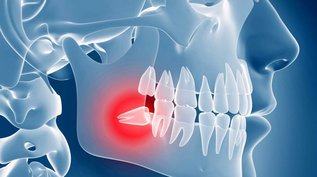
When and Why Wisdom Teeth Need to Be Removed
Wisdom teeth, the third set of molars, are often a topic of discussion among dental professionals and patients alike.
These late bloomers typically emerge in late adolescence or early adulthood, and can bring both relief and trouble to the owner.
Understanding Wisdom Teeth
Also referred to as third molars, wisdom teeth are the final set of molars that usually emerge at the farthest corners of the mouth.
Why do we have wisdom teeth? The majority of individuals have a total of four wisdom teeth, with each one located in every corner of both the upper and lower jaws. Distinct from other permanent teeth that generally appear from age 6 to 12, the emergence of wisdom teeth typically occurs later, often showing up in the late teenage years or early twenties.
The Emergence of Wisdom Teeth
Wisdom teeth, like other permanent teeth, begin developing during childhood. However, they stay hidden beneath the gum line until they are ready to make their appearance.
The exact timing of wisdom tooth emergence can vary from person to person. For some, it may happen as early as 17 or 18, while for others, it could be several years later.
The emergence of wisdom teeth can be a painful process for some individuals. This discomfort is often due to the limited space available in the jaw, leading to pressure on adjacent teeth as the wisdom teeth push through the gum tissue.
Common Reasons for Wisdom Teeth Removal

While not everyone will experience issues with their wisdom teeth, many individuals will eventually need to consider the question of: is it necessary to remove wisdom teeth?
Can you keep your wisdom teeth? Here are some common reasons for when to remove wisdom teeth:
Impaction: One of the most frequent reasons for wisdom tooth removal is impaction. When there isn't enough space in the jaw for these latecomers, they can become trapped beneath the gum line or partially emerge. This can lead to pain, infection, and damage to adjacent teeth.
Pain and Discomfort: Wisdom teeth can cause pain, swelling, and tenderness in the back of the mouth, making it uncomfortable to eat, speak, or even open the mouth fully.
Infection: Wisdom teeth that only partially emerge can create pockets where bacteria can accumulate, leading to infection and gum disease.
Misalignment: Wisdom teeth can cause shifting or crowding of other teeth as they emerge, potentially undoing the effects of previous orthodontic work.
Cysts and Tumors: In rare cases, wisdom teeth may lead to the formation of cysts or tumours, which can cause more serious health issues.
Signs and Symptoms Indicating Wisdom Teeth Issues
Recognizing the signs and symptoms of problematic wisdom teeth is crucial for timely intervention. Asking yourself, “do wisdom teeth have to be removed”, along with whether or not you experience any of the following, may indicate issues with your wisdom teeth:
Pain: Persistent pain in the back of the mouth, especially when chewing or biting down.
Swelling: Swelling of the gums or jaw in the area where wisdom teeth are emerging.
Redness: Inflamed or red gums around the wisdom teeth.
Bad Breath: Foul odour or taste in the mouth, which may be a sign of infection.
Difficulty Opening the Mouth: Limited jaw mobility due to swelling or pain.
Headaches: Discomfort and tension headaches can result from wisdom tooth issues.
If you experience any of these symptoms, it's essential to consider the benefits of wisdom teeth removal and consult with a dentist or oral surgeon for a proper evaluation.
SEDATION FOR WISDOM TEETH REMOVAL
For many individuals, the idea of wisdom teeth removal can be anxiety-inducing. Dental professionals often offer sedation options to ensure a more comfortable and pain-free experience during the procedure. Sedation can range from local anesthesia to general anesthesia, depending on the complexity of the extraction and the patient's comfort level.
When Wisdom Teeth Removal is Not Necessary
In some cases, wisdom teeth can emerge without causing any problems, and there may be benefits to keeping wisdom teeth. If the following conditions apply, wisdom teeth removal may not be necessary:
Healthy Eruption: If wisdom teeth emerge correctly, in the right position, and without crowding or damaging adjacent teeth, they may not require removal.
Adequate Space: If there's enough room in your jaw for the wisdom teeth to come in without causing discomfort or misalignment, removal may not be needed.
Good Oral Hygiene: If you can maintain proper oral hygiene around your wisdom teeth and keep them clean and free of infection, removal may be avoided.
Your dentist will assess your specific situation and advise you on whether or not wisdom tooth removal is necessary.
Complications from Untreated Wisdom Teeth
What happens if you don’t remove wisdom teeth? Delaying or avoiding the removal of problematic wisdom teeth can lead to various complications and risks, including:
Infection: Infection can spread from the wisdom teeth to other areas of the mouth, potentially causing serious health issues.
Cysts and Tumors: Untreated wisdom teeth can lead to the formation of cysts or tumours, which may require more extensive surgery to remove.
Tooth Decay: Wisdom teeth are often challenging to clean properly, leading to an increased risk of tooth decay and gum disease.
Pain and Discomfort: The ongoing pain and discomfort associated with problematic wisdom teeth can negatively impact your quality of life.
Orthodontic Problems: Wisdom teeth can push on adjacent teeth, causing misalignment and undoing previous orthodontic work.
Given these potential complications, it's crucial to consider for yourself why do wisdom teeth need to be removed and address wisdom tooth issues promptly when they arise.
Recovery and Aftercare
If you do need to have your wisdom teeth removed, you might wonder what to expect during the recovery process. Here are some guidelines for a smoother recovery:
Immediate Post-Op: After the procedure, you may experience some bleeding and swelling. Your oral surgeon will provide gauze and instructions on how to manage these symptoms. It's crucial to follow their guidance carefully.
Pain Management: Over-the-counter or prescribed pain medications can help manage post-operative pain. Follow your oral surgeon's recommendations for dosages and timing.
Diet: Stick to a soft diet for the first few days after surgery to avoid irritating the surgical sites. Gradually reintroduce solid foods as you feel comfortable.
Oral Hygiene: Continue brushing your teeth, but avoid the surgical sites for the first few days. You may also be given a special mouthwash to help keep the area clean.
Rest: Rest and avoid strenuous activities for a few days after surgery to aid in the healing process.
Follow-up appointments: Attend any follow-up appointments with your oral surgeon to monitor your recovery and ensure everything is healing properly.
With proper care and attention, the recovery period should be relatively short, and you'll be back to your normal routine in no time.
All in all, understanding when and why wisdom teeth need to be removed is essential for maintaining good oral health. While not everyone will experience issues with their wisdom teeth, it's crucial to be aware of the signs and symptoms that may indicate a problem, along with the best wisdom teeth removal age for your health.
For expert advice and assistance with wisdom teeth removal and questions such as, “how much to remove wisdom teeth?”, contact us at Skymark Smile Centre. Our experienced team is dedicated to providing top-notch dental care and can help you make informed decisions about the benefits of keeping wisdom teeth and your oral health.
Reach out to our team today to schedule a consultation and ensure your wisdom teeth are in good hands.

